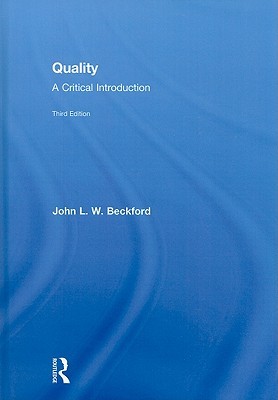Beckford on Quality
The ‘practice’ of quality has over sixty years or so become focused on compliance, standardisation and constraint. While much of this is essential to the reliability of output that is needed in the manufacturing sector it does not translate to the services sector which relies on human judgement, knowledge and emotional intelligence in delivery which creates and consumes service in an instant.
Beckford on Quality provides not a new way of doing quality, but a new way of exploring and understanding what we mean by quality, how we should interpret it through different ways of thinking and the consequences of that thinking for for quality practice. It is consciously and deliberately not a practitioner’s guide on ‘how to do’ quality.
The pursuit of quality is seen as one dimension of the pursuit of organisational effectiveness. The literature within the discipline, comprehensively reviewed within the book, offers a number of useful and unique insights and the practise of the discipline has undoubtedly brought benefits to many thousands of organisations. Quality, however, is not an end in itself but rather one of many means of achieving the goal of organisational survival.
Thinking about quality, embracing both the ideas of Lean Manufacturing and of ISO and other standards must be systemic quality management. Quality must both embrace and be embraced by thinking in terms of systems and the application of systemic methodologies to complex problems – of which quality is only ever one dimension. Those who have not yet comprehended the systemic mind-set need to do so. The fragmentation of processes and partiality of behaviours driven, perhaps demanded, by the reductionist approach are significant inhibitors of organisational effectiveness and viability. It would be perverse for me not to treat quality as a systemic challenge and offer thinking accordingly.
Rather than attempt to reinforce boundaries I have chosen to trample all over them. This thinking ostensibly about ‘quality’ celebrates the insights it offers to other disciplines and that those disciplines offer to it and it does so at three interacting levels of consideration:
Philosophy: Why are we doing this?
Strategy: What options and choices do we have?
Operations: How should we do this?
Conventional thinking about quality is stuck in the ‘how’, this work is about the why and the what?
Academic Materials will be made available shortly.
